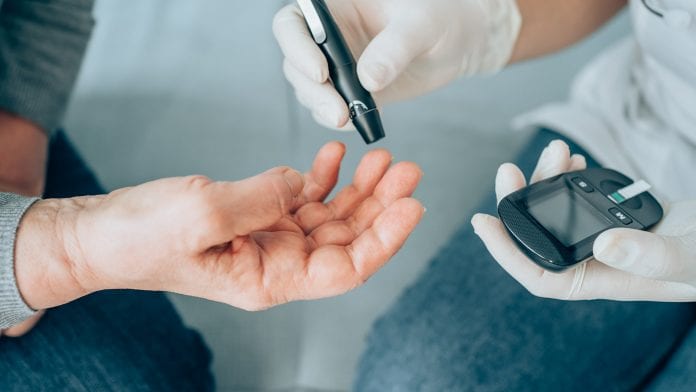
Controlling blood sugar levels early following a Type 2 diabetes diagnosis significantly impacts future prognosis, new research has found.
Researchers from the University of Gothenburg in Sweden and the University of Oxford in the UK studied the link between blood sugar levels from the point of Type 2 diabetes diagnosis and the risk of heart attacks and mortality. They discovered a significant association between early control of blood sugar levels and a lower risk of death.
The study has been published in the scientific journal Diabetes Care.
Type 2 diabetes is a condition that develops if the body can no longer respond effectively enough to its own insulin to prevent blood glucose levels from rising too high. Recommended treatment to control blood sugar levels in Type 2 diabetes ranges from dietary changes to medication.
The research, that was jointly led by Professor Marcus Lind in Gothenburg and Professor Rury Holman in Oxford, was based on a key trial in Type 2 diabetes, the UK Prospective Diabetes Study (UKPDS). The new analysis examined the role of blood sugar levels in the first years after a Type 2 diabetes diagnosis for the prognosis of myocardial infarction and death 10 to 20 years later.
Immediate blood sugar control linked to lower risk of death
The researchers found that blood sugar levels early on in the condition have a much greater impact on the future prognosis than had been previously thought. The results of the study show that action to control glucose levels according to treatment guidelines (HbA1c 52 mmol/mol or lower) from the time of diagnosis was associated with an approximately 20% lower risk of death 10 to 15 years later, compared with targeting a higher blood sugar level (HbA1c 63 mmol/mol). In addition, it showed that delaying the introduction of good glucose levels until ten years after diagnosis was associated with only a 3% lower risk of death.
Earlier diagnosis of Type 2 diabetes needed
Professor Marcus Lind said: “These latest results are evidence that proper early blood sugar treatment in Type 2 diabetes is crucial to optimise diabetes care. Previously, we haven’t performed this kind of analysis, or understood just how important early blood sugar control is for the prognosis. They also mean that there is a need for a greater focus on detecting Type 2 diabetes at the earliest opportunity, to prevent people living with undetected high blood sugar levels for several years.”
Professor Rury Holman, from the Radcliffe Department of Medicine at the University of Oxford, said: “These new results provide a mechanistic explanation for the glycaemic ‘legacy effect’, first identified by the UKPDS, whereby instituting good blood sugar control in newly diagnosed Type 2 diabetes was shown to reduce the risks of diabetic complications and death for up to 30 years. The discovery of the ‘legacy effect’ has led treatment guidelines worldwide recommending the need to achieve good blood glucose control as soon as possible.”









